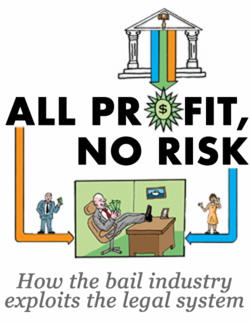New report reveals how bail bond companies exploit legal systems to profit while avoiding risk
On top of a bail system that is set up to favor companies over courts, the bail industry has lobbied for several loopholes that make their business virtually risk-free - and highly lucrative.
October 4, 2022
Easthampton, Mass. — This morning, the Prison Policy Initiative published All Profit, No Risk: How the bail industry exploits the legal system, a report exposing how commercial bail companies and their deep-pocketed insurance underwriters almost always avoid accountability when they fail to do their one job: ensure their clients’ appearance in court. The report shows that the espoused purpose of the bail industry — that “it provides a public service at no cost to the taxpayer” — is a lie.
Piecing together evidence from 28 states where bail companies have routinely avoided paying bonds “forfeited” to courts due to their clients’ non-appearance, the report shows that these incidents are not isolated local scandals. Instead, they are part of a systematic problem with commercial money bail, a problem that has been intentionally created by the industry to protect its profits.
The report explains how the bail industry exploits — and works to expand — six loopholes in the system that allow it to avoid paying up when defendants don’t appear in court. For example, bail companies have carved out months-long “grace periods” during which they do not have to pay a forfeiture as long as their client returns to court during that time. These loopholes, combined with aggressive strategies employed by the industry, have helped it reap profits while taking little risk.
These “cracks” exist on top of a bail system that is already set up to favor companies over courts (and defendants) in several ways:
- Bail companies do not pay any actual cash or property to the court up front, meaning that the onus is on the court to get the money it is owed if a defendant does not appear.
- The bail system allows companies to select clients based on financial risk (i.e., their ability to cover the entire cost of their bail bond) rather than their risk of flight.
- Companies can pass along their financial risk to defendants and their loved ones by collecting collateral.
- Bail companies are backed by deep-pocketed insurance agencies that can (and do) aggressively fight forfeitures in court.
Rather than attempting to “fix” the money bail system, the Prison Policy Initiative calls for the end of the money bail system entirely (a system that has already received due criticism for penalizing people based on their personal financial resources). The organization notes that unwinding the deeply-ingrained loopholes carved out by the industry one by one is not realistic due to the powerful political influence of bail companies.
“The money bail system is dysfunctional and broken by design, and the bail bond industry helped make it that way,” said report author Wendy Sawyer. “Governments should replace money bail with non-commercial systems that ensure court appearance while removing the profit motive.”
The report also highlights three strategies state and local governments can adopt, short of ending money bail entirely, to reign in this industry:
- Release most defendants pretrial without monetary conditions, and adopt services that support attendance;
- When monetary conditions are necessary, rely on other forms of money bail that don’t involve profit motives, such as unsecured bonds; and
- When commercial bonds are used, require bond agents to operate in cash to ensure they have a financial stake in the outcome.
The Prison Policy Initiative’s new report also includes a detailed description of the bail forfeiture process, an appendix of relevant legal statutes for all 50 states, and an appendix of evidence the organization gathered from 28 states.
The full report is available at https://www.prisonpolicy.org/reports/bail.html.




